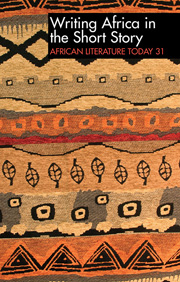Book contents
- Frontmatter
- Dedication: Chinua Achebe Joins the Ancestors
- Stop Press/ Tribute to Kofi Awoonor 1935–2013
- Contents
- Notes on Contributors
- Editorial Article
- Articles
- “Real Africa”/“Which Africa?”: The Critique of Mimetic Realism in Chimamanda Ngozi Adichie's Short Fiction
- Writing Apartheid: Miriam Tlali's Soweto Stories
- Articulations of Home & Muslim Indentity in the Short Stories of Leila Aboulela
- Ugandan Women in Contest with Reality: Mary K. Okurutu's A Women's Voice & the Women's Future
- Snapshots of the Botswana Nation: Bessie Head's The Collector of Treasures & Other Botswana Village Tales as a National Project
- Widowhood – Institutionalized Dead Weight to Personal Identity & Dignity: A Reading of Ifeoma Okoye's The Trial & Other Stories
- Feminist Censure of Marriage in Islamic Societies: A Thematic Analysis of Alifa Rifaat's Short Stories
- Diaspora Identities in Short Fiction by Chimamanda Ngozi Adichie & Sefi Atta
- Exposition of Apartheid South African Violence & Injustice in Alex la Guma's Short Stories
- Locating a Genre: Is Zimbabwe a Short Story Country?
- Mohammed Dib's Short Stories on the Memory of Algeria
- Ama Ata Aidoo's Short Stories: Empowering the African Girl-Child
- Ama Ata Aidoo: an Interview for ALT
- Reviews
Writing Apartheid: Miriam Tlali's Soweto Stories
from Articles
Published online by Cambridge University Press: 05 December 2013
- Frontmatter
- Dedication: Chinua Achebe Joins the Ancestors
- Stop Press/ Tribute to Kofi Awoonor 1935–2013
- Contents
- Notes on Contributors
- Editorial Article
- Articles
- “Real Africa”/“Which Africa?”: The Critique of Mimetic Realism in Chimamanda Ngozi Adichie's Short Fiction
- Writing Apartheid: Miriam Tlali's Soweto Stories
- Articulations of Home & Muslim Indentity in the Short Stories of Leila Aboulela
- Ugandan Women in Contest with Reality: Mary K. Okurutu's A Women's Voice & the Women's Future
- Snapshots of the Botswana Nation: Bessie Head's The Collector of Treasures & Other Botswana Village Tales as a National Project
- Widowhood – Institutionalized Dead Weight to Personal Identity & Dignity: A Reading of Ifeoma Okoye's The Trial & Other Stories
- Feminist Censure of Marriage in Islamic Societies: A Thematic Analysis of Alifa Rifaat's Short Stories
- Diaspora Identities in Short Fiction by Chimamanda Ngozi Adichie & Sefi Atta
- Exposition of Apartheid South African Violence & Injustice in Alex la Guma's Short Stories
- Locating a Genre: Is Zimbabwe a Short Story Country?
- Mohammed Dib's Short Stories on the Memory of Algeria
- Ama Ata Aidoo's Short Stories: Empowering the African Girl-Child
- Ama Ata Aidoo: an Interview for ALT
- Reviews
Summary
Miriam Tlali is a short story writer who shapes the genre to record voices from the Soweto community. In so doing her fictional forms emerge from the politics of apartheid, from the dialogue, debate, argument and rhetoric of the struggle. Her forms not only serve as a protest against the ways individual lives are deformed by the realities of the oppressive laws and restrictions but they emerge from that conflict and become vehicles expressing the injustices black South Africans faced daily. In describing the setting of her first novel, Muriel at Metropolitan (1975) Miriam Tlali claims the store is ‘like a kind of stage where the whole of the South African scenario was being played out’ (Jolly 1998: 144). In a sense, this allusion to the dramatic captures the essence of Tlali's writing where the use of dialogue and the recording of voices constitutes so much of the content of her novels, stories, interviews and journalism. The evolution of Tlali's forms reflects her decision to foreground voices in her texts from the first person Muriel at Metropolitan (republished in 2004 as Between Two Worlds, Tlali's original and preferred title) to Amandla! which draws heavily on various discourses — dialogue, debate, speeches and pamphlets — to Mihloti and Soweto Stories which are interviews, first person journalistic accounts and stories Tlali bases on conversations with people who came to her with their experiences of township life.
- Type
- Chapter
- Information
- Writing Africa in the Short Story , pp. 25 - 39Publisher: Boydell & BrewerPrint publication year: 2013

